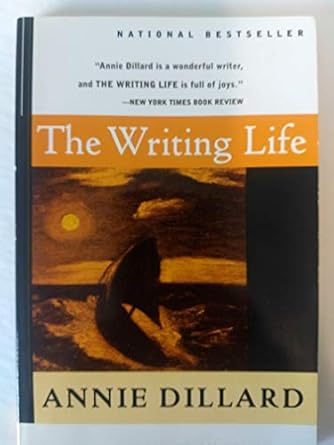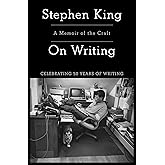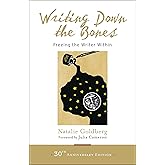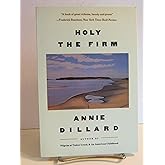
Amazon Prime Free Trial
FREE Delivery is available to Prime members. To join, select "Try Amazon Prime and start saving today with FREE Delivery" below the Add to Cart button and confirm your Prime free trial.
Amazon Prime members enjoy:- Cardmembers earn 5% Back at Amazon.com with a Prime Credit Card.
- Unlimited FREE Prime delivery
- Streaming of thousands of movies and TV shows with limited ads on Prime Video.
- A Kindle book to borrow for free each month - with no due dates
- Listen to over 2 million songs and hundreds of playlists
Important: Your credit card will NOT be charged when you start your free trial or if you cancel during the trial period. If you're happy with Amazon Prime, do nothing. At the end of the free trial, your membership will automatically upgrade to a monthly membership.
Buy new:
-29% $11.38$11.38
Ships from: Amazon.com Sold by: Amazon.com
Save with Used - Good
$9.84$9.84
Ships from: Amazon Sold by: ZBK Wholesale

Download the free Kindle app and start reading Kindle books instantly on your smartphone, tablet, or computer - no Kindle device required.
Read instantly on your browser with Kindle for Web.
Using your mobile phone camera - scan the code below and download the Kindle app.



 Audible sample
Audible sample The Writing Life Paperback – November 12, 2013
Purchase options and add-ons
"For nonwriters, it is a glimpse into the trials and satisfactions of a life spent with words. For writers, it is a warm, rambling, conversation with a stimulating and extraordinarily talented colleague." — Chicago Tribune
From Pulitzer Prize-winning Annie Dillard, a collection that illuminates the dedication and daring that characterizes a writer's life.
In these short essays, Annie Dillard—the author of Pilgrim at Tinker Creek and An American Childhood—illuminates the dedication, absurdity, and daring that characterize the existence of a writer. A moving account of Dillard’s own experiences while writing her works, The Writing Life offers deep insight into one of the most mysterious professions.
- Print length111 pages
- LanguageEnglish
- Publication dateNovember 12, 2013
- Dimensions5.31 x 0.29 x 8 inches
- ISBN-100060919884
- ISBN-13978-0060919887
- Lexile measure880L
Book recommendations, author interviews, editors' picks, and more. Read it now.
Frequently bought together
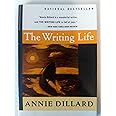
Customers who viewed this item also viewed
Editorial Reviews
Amazon.com Review
This all makes The Writing Life seem a dense, tough read, but that is not the case at all. Dillard is, after all, human, just like the rest of us. During one particularly frantic moment, four cups of coffee and not much writing down, Dillard comes to a realization: "Many fine people were out there living, people whose consciences permitted them to sleep at night despite their not having written a decent sentence that day, or ever." --Jane Steinberg
From Publishers Weekly
Copyright 1990 Reed Business Information, Inc.
Review
"A kind of spiritual Strunk White, a small and brilliant guidebook to the landscape of a writer's task...Dillard brings the same passion and connective intelligence to this narrative as she has to her other work." — Boston Globe
"For her book is...scattered with pearl. Each reader will be attracted to different bright parts...Gracefully and simply told, these little stories illuminate the writing life...Her advice to writers is encouraging and invigorating." — Cleveland Plain Dealer
"For nonwriters, it is a glimpse into the tirals and satisfactions of a life spent with words. For writers, it is a warm, rambling, conversation with a stimulating and extraordinarily talented colleague." — Chicago Tribune
"The Writing Life is a spare volume...that has the power and force of a detonating bomb...A book bursting with metaphors and prose bristling with incident." — Detroit News
From the Back Cover
Annie Dillard has written eleven books, including the memoir of her parents, An American Childhood; the Northwest pioneer epic The Living; and the nonfiction narrative Pilgrim at Tinker Creek. A gregarious recluse, she is a member of the American Academy of Arts and Letters.
About the Author
Annie Dillard is the Pulitzer Prize-winning author of Pilgrim at Tinker Creek, An American Childhood, The Writing Life, The Living and The Maytrees. She is a member of the Academy of Arts and Letters and has received fellowship grants from the John Simon Guggenheim Foundation and the National Endowment for the Arts.
Excerpt. © Reprinted by permission. All rights reserved.
The Writing Life
By Dillard, AnniePerennial
Copyright ©2004 Annie DillardAll right reserved.
ISBN: 0060919884
Chapter One
When you write, you lay out a line of wards. The line of words is a miner's pick, a woodcarver's gouge, a surgeon's probe. You wield it, and it, digs a path you, follow. Soon you find yourself deep in new territory: Is it a dead end, or have you located the real subject? You will know tomorrow, or this time next year.
You make the path boldly and follow it fearfully. You go where the path leads. At the end of the path, you find a box canyon. You hammer out reports, dispatch bulletins.
The writing has changed, in your hands, and in a twinkling, from an expression of your notions to an epistemological tool. The new place interests you because it is not clear. You attend. In your humility, you lay down the words carefully, watching all the angles. Now the earlier writing looks soft and careless. Process is nothing; erase your cracks. The path is not the work. I hope your tracks have grown over; I hope birds ate the crumbs; I hope you will toss it all and not look back.
The line of words is a hammer: You hammer against the walls of your house. You tap the walls, lightly, everywhere. After giving many years' attention to these things, you know what to listen for. Some of the walls are bearing walls; they have to stay, or everything will fall down. Other walls can go with impunity; you can hear the difference. Unfortunately, it is often a bearing wall that has to go. It cannot be helped. There is only one solution, which appalls you, but there it is. Knock it out. Duck.
Courage utterly opposes the bold hope that this is such fine stuff the work needs it, or the world. Courage, exhausted, stands on bake reality: this writing weakens the work. You must demolish the work and start, over. You can save some of the sentences, like bricks. It will be a miracle if you can save some of the paragraphs, no matter hogi excellent in themselves 'or hard-won. You can waste a' year worrying about it; or you can get it over with now. (Are you awoman, or a mouse?)
The part you must jettison is riot only the bestwritten part; it is also; oddly, that part'which was to have been the very' point. It is the original key passage, the passage on which the rest was to hang; and from which you'yourself drew the courage to begin. Henry James knew it well, and said it best. In his preface to The Spoilt of Poynton, he pities the writer, in a comical pair of sentences that rises to a howl: "Which is the work in which he hasn't surrendered, under dire difficulty, the best thing he meant to have kept? In which indeed, before the dreadful done, doesn't he ask himself what has become of the thing all for the sweet sake of which it was to proceed to that ektremity?"
So it is that a writer writes many books. In each book, he intended several urgent and vivid points, many of which he sacrificed as the book's form hardened. '"The youth gets together his materials to build a bridge to the moon," Thoreau noted mournfully, "or perchance a palace or temple on the earth and at length the middle-aged man concludes to build a wood-shed with them." The writer returns to these materials, these passionate subjects, as to unfinished business, for they are his life's work.
It is the beginning of a work that the writer throws away.
A painting covers its tracks. Painters work from the ground up. The latest version of a painting overlays earlier versions, and obliterates them. Writers, on the other hand, work from left to right. The discardable chapters are on the left. The latest version of a literary work begins somewhere, in the work's middle, and hardens toward the end. The earlier version remains lumpishly on the left; the work's beginning greets the reader with the wrong hand.
Excerpted from The Writing Lifeby Dillard, Annie Copyright ©2004 by Annie Dillard. Excerpted by permission.
All rights reserved. No part of this excerpt may be reproduced or reprinted without permission in writing from the publisher.
Excerpts are provided by Dial-A-Book Inc. solely for the personal use of visitors to this web site.
Product details
- Publisher : Harper Perennial (November 12, 2013)
- Language : English
- Paperback : 111 pages
- ISBN-10 : 0060919884
- ISBN-13 : 978-0060919887
- Lexile measure : 880L
- Item Weight : 3.99 ounces
- Dimensions : 5.31 x 0.29 x 8 inches
- Best Sellers Rank: #25,525 in Books (See Top 100 in Books)
- #63 in Essays (Books)
- #76 in Fiction Writing Reference (Books)
- #2,481 in Literary Fiction (Books)
- Customer Reviews:
About the author
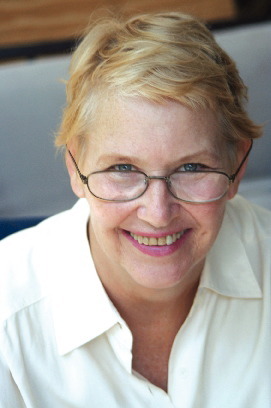
Annie Dillard is the author of ten books, including the Pulitzer Prize-winner Pilgrim at Tinker Creek, as well as An American Childhood, The Living, and Mornings Like This. She is a member of the Academy of Arts and Letters and has received fellowship grants from the John Simon Guggenheim Foundation and the National Endowment for the Arts. Born in 1945 in Pittsburgh, Dillard attended Hollins College in Virginia. After living for five years in the Pacific Northwest, she returned to the East Coast, where she lives with her family.
Customer reviews
Customer Reviews, including Product Star Ratings help customers to learn more about the product and decide whether it is the right product for them.
To calculate the overall star rating and percentage breakdown by star, we don’t use a simple average. Instead, our system considers things like how recent a review is and if the reviewer bought the item on Amazon. It also analyzed reviews to verify trustworthiness.
Learn more how customers reviews work on AmazonCustomers say
Customers find the writing quality and inspiration in this book to be excellent. They describe it as a thoughtful, encouraging read that provides insights into the writing process. The style is described as beautiful, unique, and vibrant. Readers appreciate the sharp images and illustrations that capture her point. Overall, customers find the book enjoyable and wonderful. However, some feel the pacing is a bit rambling, with the chapters not neatly connected.
AI-generated from the text of customer reviews
Customers appreciate the writing quality. They find it insightful and enjoyable to read, with useful tips for writers at all stages. The author expresses real human experiences in a straightforward and poetic voice.
"...a how-to book about how to craft the perfect sentence, write believable dialogue, or "show, not tell," but instead the small volume was about..." Read more
"Dillard, in lovely metaphorical language, describes the contradictions in writing: a bold path fearfully followed...." Read more
"...prose is elegant and lyrical and yes, her metaphorical descriptions of things are beautifully rendered — but there was too much of it, in my opinion..." Read more
"Love the way the writing process is laid out, the feelings and the mind trips of creativity...." Read more
Customers find the book inspiring and encouraging. They appreciate the insights it provides into writing as art. The stories are full of metaphors and sharp images that engage readers on multiple levels.
"...For me, it stirred a few deep thoughts, reminding me that I really couldn’t give up writing — and that’s what the writing life is...." Read more
"...Writers will see the metaphors behind the imagery, the lesson in the stories, and all the hidden slivers of light and truth hiding between the..." Read more
"...What I especially enjoyed about the book were the several stories about topics ranging from playing softball with young music prodigies to flying..." Read more
"...This was lovely to read—full of striking metaphor and sharp images, and there were good bits throughout." Read more
Customers find the book easy to read and engaging. They describe it as a must-read for aspiring writers, with an interesting perspective on life and writing. The prose captures the reader's attention and holds them in a web of enchantment.
"...This is my favorite book on writing,” she said to me, “and you simply must read it,” and so I did...." Read more
"...Reading about the habits and inspiration of other writers was interesting too. Who knew that Eudora Welty loved Chekhov?..." Read more
"...This was lovely to read—full of striking metaphor and sharp images, and there were good bits throughout." Read more
"...this book is a reflective look at the writing process and largely meant for literary snobs...." Read more
Customers appreciate the book's style. They find it beautiful and thoughtful, offering a new perspective on life and the writing process. The author uses vibrant analogies and metaphors to convey her insights. Readers appreciate the thoughtful and generous way of writing.
"...A few things to say here. This book, is in and of itself, a masterful work of art...." Read more
"...in creating writing spaces and scrutinizing vistas and objects to glean crisp and sparkling descriptions...." Read more
"...the rest of her books, all of which are not only delightful, but utterly unique. I have been giving them to all my friends who hasn't read her...." Read more
"Beautiful, just beautiful...." Read more
Customers like the book's images. They find it full of sharp illustrations that capture the author's point. The book provides an honest and detailed look at what it's like to be a painter.
"...Annie Dillard fills this one with many ridiculous stories and illustrations that capture her point...." Read more
"...This was lovely to read—full of striking metaphor and sharp images, and there were good bits throughout." Read more
"...She really emphasizes the big picture and the long vision. She speaks of years, not of mere months...." Read more
"...of practical elements and spiritual commitment leading to great art." Read more
Customers enjoy the book. They find the prose engaging and educational, describing it as an enjoyable experience.
"...Her style is her own and stays true. Enjoyable, but felt a little incomplete." Read more
"For me this was a wonderful ride. Ann Dillard takes us on a journey exploring what it takes,and feels like, to create...." Read more
"Fun. Inspiring. Without pretense or defense. Warmly honest." Read more
"...and read the conclusions her mind delivers in fine tuned prose is enjoyable, inspiring and educational. In other words, a delicious treat." Read more
Customers find the pacing of the book a bit rambling and unnecessarily disconnected. They also mention it's less brilliant than Living by Fiction and less refined than Tinker Creek. The first 15 pages are jarring for some readers, with random stories and philosophical elements.
"...The first 15 pages were a little jarring. I wondered to myself if this actually was a book about writing...." Read more
"...it came across a little too highbrow and abstract for me in some places — which is why I decided to go with..." Read more
"...This is a book about process, with all its torturous ups and downs...." Read more
"...That said, I found the chapters rambling. Not neatly connected. Perhaps that's the nature of her writing, or the nature of her subject...." Read more
Reviews with images
Product came damaged. Don't have time to send back.
Top reviews from the United States
There was a problem filtering reviews right now. Please try again later.
- Reviewed in the United States on August 13, 2015I like to consider myself a writer. On the good days, that means I write, but mostly I fiddle around and tinker. I had hoped that Writing Life would be the silver bullet, all of a sudden I’d understand how to write, and the heavens would be opened and I’d sign six-figure book deals (this didn’t happen). Annie Dillard did a phenomenal job with Pilgrim at Tinker Creek, and she’s one of my favorite writers, so I figured I could do little better for a book on writing.
But rather than being a handbook on how to write, The Writing Life is a collection of stories accumulated during the writing of several books. Annie Dillard does not explain how to write books — she explains how to live a life in which you write, all day every day, and try to create with words on a page. There are few techniques here; rather, the book is filled with stories of how it feels to be stuck in a spot in the book (been there) and why the end product is never quite what we’d imagined starting out (felt that).
Mostly, The Writing Life tells you what to expect if you’re going to write books. It teaches you how to see stories with your eyes so that you can transfer them to your medium: the printed page. For me, it stirred a few deep thoughts, reminding me that I really couldn’t give up writing — and that’s what the writing life is. Closing the back page left me wanting to run and work on my writing from years ago. If you’re a writer — or wondering if you ought to keep trying to be a writer — The Writing Life will tell you.
Like any other of her books, Annie Dillard fills this one with many ridiculous stories and illustrations that capture her point. Her books are like a million sparks that fly up from a burning log: filled with many individual, unique stories. And here’s where the similarities to Pilgrim begin. Much like that book, the stories in The Writing Life made me want to follow in Dillard’s footsteps. This, I’d guess, is exactly why the book was written.
I’d recommend The Writing Life if you are looking at being a writer, are a writer, may someday be a writer, are married to a writer — if you’re at all connected to writing, you’ll enjoy the stories and message of this book. And if you’re not sure if you’re cut out to be a writer, give this a read: it’s only 120 pages. Maybe, like me, you’ll find out that you can’t not write.
- Reviewed in the United States on January 9, 2025I received this book as a Christmas gift from another friend, a fellow writer of immeasurable talent and small renown. “This is my favorite book on writing,” she said to me, “and you simply must read it,” and so I did.
The first 15 pages were a little jarring. I wondered to myself if this actually was a book about writing. My friend has never led me astray in the way of good books, however, so I pressed on until the end.
A few things to say here. This book, is in and of itself, a masterful work of art. Most readers would hate it, though, as most readers are not writers. Writers will see the metaphors behind the imagery, the lesson in the stories, and all the hidden slivers of light and truth hiding between the words.
If you’re a reader, keep scrolling because this book is simply not for you. If you’re a writer, however, you simply must read this book.
- Reviewed in the United States on March 9, 2013Although The Writing Life was not what I expected, I thoroughly enjoyed reading it. I thought it was going to be full of advice, a how-to book about how to craft the perfect sentence, write believable dialogue, or "show, not tell," but instead the small volume was about Annie Dillard's daily life and her writing struggles.
A student of life in all forms (including moths and cats), Dillard illustrates that everything can be a subject worthy of writing about. How does she do it? Is there a secret? No. What she does is seclude herself from the world in places such as remote cabins and small rooms. It's a lonely life, often frustrating and aggravating. Once while working in an office on a university campus, Dillard kept the blinds closed to shut out the world. One night she kept hearing what she thought was a June bug hitting the window pane, and when she peeped behind the slats, she saw fireworks exploding and blossoming in the night sky. She had been so into her work that she had forgotten it was July 4th.
What I especially enjoyed about the book were the several stories about topics ranging from playing softball with young music prodigies to flying with an ace pilot. Every story has something relevant to the writing life. My favorite story was that of Paul Glenn when Dillard asked him how his work was going. Glenn told of a man who had been carried out to sea trying to bring a log in; despite the tides and currents, the man kept on rowing, just like Glenn kept on writing. Reading about the habits and inspiration of other writers was interesting too. Who knew that Eudora Welty loved Chekhov?
As a would-be writer who sometimes finds herself doubting whether people would be interested in reading what she has learned, I was encouraged by Dillard's comment, "The impulse to keep to yourself what you have learned is not only shameful, it is destructive. Anything you do not give freely and abundantly becomes lost to you. You open your safe and find ashes."
Top reviews from other countries
 Joy LlewellynReviewed in Canada on February 12, 2023
Joy LlewellynReviewed in Canada on February 12, 20235.0 out of 5 stars An inspiring, joyful, poignant look at the world through a 4 star writer’s eyes.
I highlighted my way through this book, flagging sentences to reread when I needed a nudge—sometimes gentle, sometimes a kick in the pants—to sit down and get back to writing. That says it all. A blessed book for a writer, painter, or person to read.
 VeedeeReviewed in India on November 23, 2018
VeedeeReviewed in India on November 23, 20185.0 out of 5 stars Writing tips
A good read to improve your writing skills
-
 MarlaReviewed in Spain on December 7, 2016
MarlaReviewed in Spain on December 7, 20164.0 out of 5 stars Para escritores y todo aquel interesado o creador de contenidos.
El libro llegó perfecto y bueno te tiene que gustar sobre lo que trata y estar interesado en el tema. A mi me ha gustado mucho.
 Marcus BaumgartReviewed in Australia on December 28, 2016
Marcus BaumgartReviewed in Australia on December 28, 20165.0 out of 5 stars Still amazing
I have read this three times. Still continues to move me. Very Raw, very honest and contains some hard truths.
 Shelley DayReviewed in the United Kingdom on May 10, 2016
Shelley DayReviewed in the United Kingdom on May 10, 20165.0 out of 5 stars To be read again and again, I'd say
This book is a must-read for anyone who's a writer or who wants to be a writer. It's brutally honest about what creative writing is like, what it involves, the compulsive necessity and the insurmountable difficulty of it you can't ever triumph over or get away from. I found so much truth in this book. And yes, it does make you ask yourself - as Annie does - why you ever even try to write in the first place. And, like Annie, you don't come up with any answer beyond a knowing kind of shrug. This book makes more visible than many the deep mysteries of the creative process but it does so via anecdotes and metaphors and parables Annie tells and together they all add up to an experience you know about, you really do know about. The whole thing's like a poem - in the broadest sense - in that its small mundane details take you to somewhere huge and elsewhere entirely. To be read again and again, I'd say.
One person found this helpfulReport



